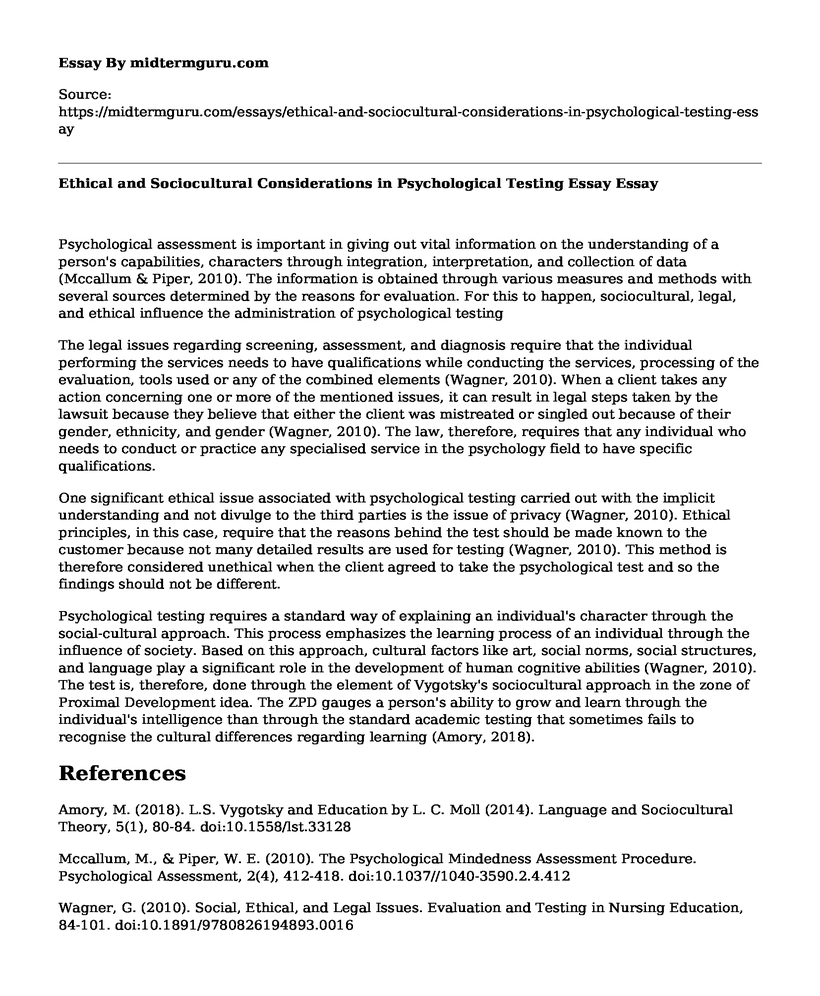Psychological assessment is important in giving out vital information on the understanding of a person's capabilities, characters through integration, interpretation, and collection of data (Mccallum & Piper, 2010). The information is obtained through various measures and methods with several sources determined by the reasons for evaluation. For this to happen, sociocultural, legal, and ethical influence the administration of psychological testing
The legal issues regarding screening, assessment, and diagnosis require that the individual performing the services needs to have qualifications while conducting the services, processing of the evaluation, tools used or any of the combined elements (Wagner, 2010). When a client takes any action concerning one or more of the mentioned issues, it can result in legal steps taken by the lawsuit because they believe that either the client was mistreated or singled out because of their gender, ethnicity, and gender (Wagner, 2010). The law, therefore, requires that any individual who needs to conduct or practice any specialised service in the psychology field to have specific qualifications.
One significant ethical issue associated with psychological testing carried out with the implicit understanding and not divulge to the third parties is the issue of privacy (Wagner, 2010). Ethical principles, in this case, require that the reasons behind the test should be made known to the customer because not many detailed results are used for testing (Wagner, 2010). This method is therefore considered unethical when the client agreed to take the psychological test and so the findings should not be different.
Psychological testing requires a standard way of explaining an individual's character through the social-cultural approach. This process emphasizes the learning process of an individual through the influence of society. Based on this approach, cultural factors like art, social norms, social structures, and language play a significant role in the development of human cognitive abilities (Wagner, 2010). The test is, therefore, done through the element of Vygotsky's sociocultural approach in the zone of Proximal Development idea. The ZPD gauges a person's ability to grow and learn through the individual's intelligence than through the standard academic testing that sometimes fails to recognise the cultural differences regarding learning (Amory, 2018).
References
Amory, M. (2018). L.S. Vygotsky and Education by L. C. Moll (2014). Language and Sociocultural Theory, 5(1), 80-84. doi:10.1558/lst.33128
Mccallum, M., & Piper, W. E. (2010). The Psychological Mindedness Assessment Procedure. Psychological Assessment, 2(4), 412-418. doi:10.1037//1040-3590.2.4.412
Wagner, G. (2010). Social, Ethical, and Legal Issues. Evaluation and Testing in Nursing Education, 84-101. doi:10.1891/9780826194893.0016
Cite this page
Ethical and Sociocultural Considerations in Psychological Testing Essay. (2022, Aug 18). Retrieved from https://midtermguru.com/essays/ethical-and-sociocultural-considerations-in-psychological-testing-essay
If you are the original author of this essay and no longer wish to have it published on the midtermguru.com website, please click below to request its removal:
- Childrens Eating Behavior - Paper Example
- Emotional Intelligence Effects on a Students Career Employability
- Feelings of Rejection - Assignment Example
- Paper Example on Knowing Self and Others
- Why People Fear Visiting the Dentist: Reasons and Solutions - Essay Sample
- Psychology of Emotion, Motivation & Stress: Impact on Humans - Essay Sample
- Residents of Prinsloo vs Oil Refinery: An Ethical Dilemma - Essay Sample







